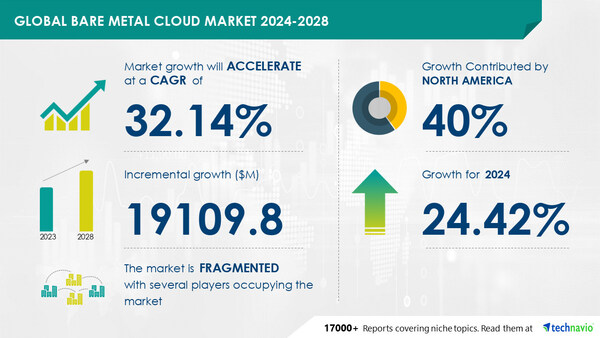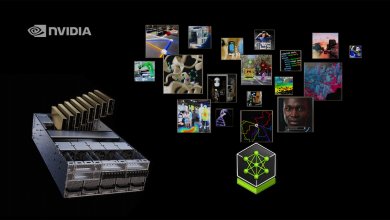Bare Metal Cloud Market Size Set to Grow by USD $19.10B—Technavio
Increasing Online Content with High Internet Penetration Is Driving Market Growth

The global bare metal cloud market size is estimated to grow by USD $19.10 billion from 2024 to 2028, according to Technavio. The market is estimated to grow at a compound annual growth rate of 32.14% during the forecast period.
Increasing online content with high internet penetration is driving market growth, with a trend towards the emergence of hyper-convergence technology. However, system integration and interoperability issues pose a challenge.
Key market players include Alibaba Group Holding Ltd., Amazon.com Inc., Bigstep Cloud Ltd., Dell Technologies Inc., E2E Networks Ltd., Equinix Inc., G2.com Inc., Internap Holding LLC, International Business Machines Corp., Heficed, Leaseweb Global BV, Limestone Networks Inc., Lumen Technologies Inc., NetApp Inc., Oracle Corp., Platform9 Systems Inc., Rackspace Technology Inc., Samsung Electronics Co. Ltd., Unitied Internet AG, and Zenlayer Inc.
Key Market Trends Fueling Bare Metal Cloud’s Rise
Bare metal cloud solutions are gaining popularity among organisations due to their hyper-converged infrastructure, which combines storage, computing, and virtual computing technologies in a single X-86-based server. This approach reduces complexities in storage systems, optimises space, and improves operational efficiency, speed, and agility.
Advanced analytics is a new trend in business, helping companies understand data from various sources and gain insights into consumer behavior. Predictive analytics, a process of analysing large datasets using advanced mathematics and statistical tools, eliminates errors and forecasts future scenarios. Hyper-converged storage in bare metal cloud supports improved analytics by providing a large unit of storage for business data. Dell Inc.
Other leading vendors, such as IBM and Oracle, are investing in hyper-converged storage solutions using web-scale technologies and architecture. This technology is still in its early stages, but its benefits, such as simplified IT infrastructure and cost savings, make it an attractive option for large and medium-sized organizations.
Bare metal cloud is a trending solution for businesses seeking high-performance computing without the overhead of virtualized cloud instances. This approach uses physical servers instead, providing clients with full control over their IT infrastructure. Bare metal cloud offers cost-efficient benefits for large enterprises in sectors like IT and telecom, retail and consumer goods, and high-performance computing. Virtual networks ensure secure and reliable connectivity. Negative aspects, on the other hand, include higher upfront costs and potential security risks.
Networking, security, database, and storage services are available. Compute services offer operational efficiency, load balancing, and risk analytics through statistical models and predictive analysis. Bare Metal Cloud is ideal for businesses dealing with complex simulations, AI, IoT, and edge computing. Factors like inflation and oil prices impact hardware components’ costs. Multi-tenant environments require robust security measures to prevent breaches. Overall, Bare metal cloud offers a balance between technological aspects and business information, allowing for accurate estimations in today’s dynamic market.
Market Challenges
In today’s business landscape, the adoption of advanced technologies in various industries, such as BFSI, IT and telecom, healthcare, and media, is on the rise. However, this technological evolution brings about system integration and interoperability challenges when organisations attempt to integrate their current IT systems with new cloud infrastructure.
Vendors must offer unified bare metal cloud solutions to help businesses manage their cloud infrastructure while ensuring seamless integration with their existing IT systems. Technical glitches during operations can lead to significant costs and reduced operational efficiencies. Integration issues often arise when organisations update their IT systems or merge IT infrastructure from acquisitions. Efficiently integrating bare metal cloud systems and advanced technologies with traditional IT infrastructure necessitates the involvement of an experienced IT team.
Businesses face numerous challenges in today’s digital landscape, including the rising costs of cloud computing, inflation, and fluctuating oil prices. Traditional virtualised cloud instances on shared resources cannot always provide the required performance for high-performance computing, complex simulations, or edge computing in retail and consumer goods, AI, Big Data, mobility, social media, and IoT. Security breaches in multi-tenant environments are also a concern.
Bare metal cloud offers a solution by providing businesses with dedicated physical servers, allowing them to maintain control over their OS, hardware components, and virtualisation infrastructure. With superior performance, reliability, adaptability, and scalability, Bare metal cloud services from Equinix, Packet, Oracle Cloud, and others enable businesses to meet their unique needs while complying with trade regulations.




